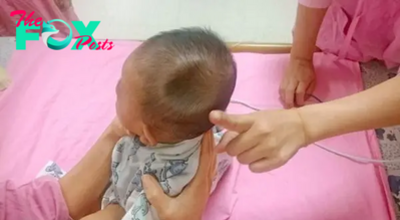Lifestyle
A Plus-Size Model Silenced Critics That Said She Should Stop Showing Off Her Body
Meet Abby, a 25-year-old woman who loves bikinis and believes they suit her well. Despite hurtful comments, her body-positive attitude encourages people and proves that all bodies are beautiful. Let’s take a look at her daring photos and hear what she has to say.
Meet Abby, a confident body-positive influencer.

Abby Bible, known as @theabbybible on TikTok, is determined to keep a positive attitude and not let negative people bring her down. This size 22 fashion iNFLuencer proudly calls herself an “unapologetic fat gal and fashion lover.”
Abby, a fashion enthusiast from New York City, has become really popular on social media with a massive following of 193K devoted fans on TikTok, all thanks to her stylish outfits and positive vibes. Even though her social media pages are filled with love, Abby does encounter some haters from time to time.

Instead of allowing online haters to shake her confidence, Abby confronts them head-on and frequently shares their comments with her followers. In a recent video, Abby donned a stylish red bikini and addressed a mean comment that said: “Fat people shouldn’t wear string bikinis.”
Abby confidently put on her sunglasses, gazed into the camera, and playfully mimed, “I don’t care.” She followed it up with, “If you don’t like it, look away.”
Abby’s video has made a strong impression, gathering thousands of views in no time.

Abby’s video received a positive response with 3.880 likes, 341 comments, and 241 shares on social media. Users were overwhelmingly supportive in their words, expressing their love for Abby and her confidence. Some comments praised her beauty, while others cheered her on. One person even shared that they bought their first bikini because of Abby’s influence.
Abby also shared a photo of herself eating a hot dog, knowing trolls might criticize her. In the caption, she highlighted the power of upsetting some people by simply enjoying a hot dog. In another post, she celebrated reaching 50k followers and expressed gratitude for the positive impact she could make on her audience despite the negativity on the internet.
Abby serves as a reminder that every individual’s body is distinct and beautiful in its own way.

Abby consistently wows her audience with her stylish clothing choices and oozes confidence. As a content creator, she proudly identifies as an “unapologetic fashion lover” in size 22. Her Instagram feed is filled with regular posts featuring her outfits.
On Instagram, Abby opened up about her past hesitations to appear in casual attire without makeup, feeling the need to always look “put together.” She emphasized that everyone is entitled to be casual and comfortable in their style.
Abby boldly embraces her body and confidently flaunts micro-bikinis whenever the opportunity arises.

In a talk show confessional, she passionately declared, “Just because you’re thin, doesn’t mean you’re better than me.” The iNFLuencer consistently reinforces her message online by reminding other women that plus-size bodies are attractive and look fantastic in a bikini.
However, Abby sadly faces continuous online trolling due to her body positivity activism, which she attributes to “people hating on individuals with larger bodies.” She responded on Instagram by emphasizing that people don’t have to be in smaller bodies to lead a fulfilling life.
She highlighted the significance of cherished memories with friends and family by the pool or at the beach, stating that life doesn’t magically begin when you lose weight. She emphasized that everyone is valuable and deserves a beautiful life just as they are.

Before you leave, don’t forget to check out the article discussing a plus-size model speaking out against hurtful comments that claim her boyfriend is “too attractive” for her.
Preview photo credit theabbybible / Instagram
We’ve All Waited for It: Scientists Created a Drug That Can Help Regrow Lost Teeth
The tooth fairy is a welcome guest for any child who has lost a tooth. Not only will the fairy leave a small gift under the child’s pillow, but they be assured of a replacement tooth in a few months. Unfortunately, the scenario is quite different for adults grappling with a loss of teeth. Luckily, there may be some hope thanks to a new study performed by scientists at Kyoto University and the University of Fukui.
A dental breakthrough
While the typical adult mouth houses 32 teeth, approximately 1% of the population exhibits variations of them, either possessing more or fewer teeth due to congenital conditions. Researchers have delved into the genetic factors behind cases of excessive teeth, seeking valuable insights into the potential regeneration of teeth in adults. This study is the first to show that monoclonal antibodies can help regrow teeth. It suggests a new way to treat a dental problem that currently requires implants and other artificial solutions.
A bit of science
The research team disclosed that an antibody targeting a specific gene, known as uterine sensitization-associated gene-1 (USAG-1), can induce tooth development in mice affected by tooth agenesis, a congenital condition. The findings were published in the journal, Science Advances.
As per Katsu Takahashi, a senior lecturer at the Kyoto University Graduate School of Medicine and one of the principal contributors to the study, the essential molecules crucial for the development of teeth have already been pinpointed. “The morphogenesis of individual teeth depends on the interactions of several molecules including BMP, or bone morphogenetic protein, and Wnt signaling,” says Takahashi.

On April 13, 2021, the University of Kyoto posted its first pic of newly-grown teeth in mice.
BMP and Wnt are involved in more than just tooth development; they affect the growth of organs and tissues early in the body’s development. Because drugs affecting them directly might have broad side effects, scientists are cautious. To find a potentially safer method, researchers focused on the gene USAG-1, thinking that aiming at factors countering BMP and Wnt specifically in tooth development could be more precise.
“We knew that suppressing USAG-1 benefits tooth growth. What we did not know was whether it would be enough,” added Takahashi.
The first results
Scientists looked at how different monoclonal antibodies affect USAG-1. Monoclonal antibodies are often used to treat things like cancer and arthritis and for making vaccines. Tests with this antibody showed that BMP signaling is crucial for deciding the number of teeth in mice. Also, just one treatment was enough to grow a whole tooth. Further tests confirmed these positive results in ferrets too.
“Ferrets are diphyodont animals with similar dental patterns to humans. Our next plan is to test the antibodies on other animals, such as pigs and dogs,” explained Takahashi.

Fully regrown frontal teeth in ferrets
The next steps

Now, scientists are going to test the drug on Healthy adults. If that goes well, the team plans to try it on kids aged 2 to 6 with a rare tooth problem called anodontia, a genetic disorder defined as the absence of all teeth. These kids will get one shot of the drug to see if it makes their teeth grow. If everything works out, the medicine might be approved by 2030.
Takahashi sees the new medicine as an additional choice for individuals who are missing some or all of their teeth.
“The idea of growing new teeth is every dentist’s dream,” Takahashi told the Japanese newspaper, The Mainichi in June this year. “I’ve been working on this since I was a graduate student. I was confident I’d be able to make it happen.”
So hopefully, by the year 2030, humans will get a chance to have their third generation of teeth grown and say goodbye to implants. Until then, make sure to keep your teeth strong and Healthy — this article will help you with that.
Preview photo credit KyotoU_News / Twitter
-

 Lifestyle1h ago
Lifestyle1h agoSY He may not have both arms and legs, but to me, he is still absolutely perfect.
-

 Lifestyle1h ago
Lifestyle1h ago“Two Exceptional Years: Celebrating the Extraordinary Journey of a Remarkable Young Boy” LS
-

 Lifestyle3h ago
Lifestyle3h agoBeauty Alana Gelmi Attracts all eyes with her beauty
-

 Lifestyle3h ago
Lifestyle3h agoSupermodel Gabi Ciamp shows off her curves in a beautiful swimsuit with a new set of photos looking seductive and gorgeous
-

 Lifestyle3h ago
Lifestyle3h agoAbnormal appearance of a 4-month-old baby: Apple-shaped concave head phenomenon due to mother’s carelessness
-

 Lifestyle3h ago
Lifestyle3h agoThe doctor showed the mother a few dances with the intention of helping her give birth easily. What was surprising was that as soon as the dance ended, she entered the delivery room. The video has reached millions of views on tiktok
-

 Lifestyle3h ago
Lifestyle3h agoTaylor Swift and Travis Kelce Enjoy a Romantic Getaway in Italy. nobita
-

 Lifestyle4h ago
Lifestyle4h agoNabeel Zafar thinks Sania Mirza should remarry























